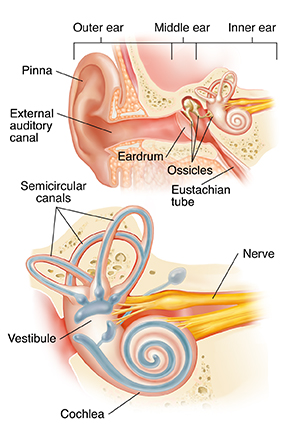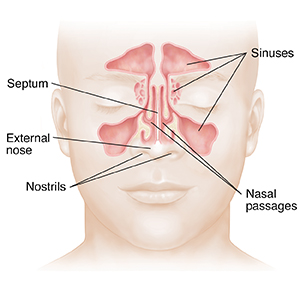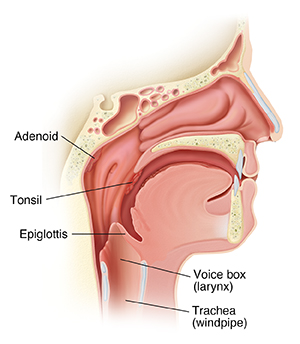Ear, Nose, and Throat Facts
What is the ear?
The ear is the organ of hearing and balance. The ear is made up of:
-
External or outer ear. This includes:
-
Eardrum (tympanic membrane). The eardrum divides the external ear from the middle ear.
-
Middle ear (tympanic cavity). This is made up of:
-
Ossicles. These are the 3 small bones that are connected and transmit the sound waves to the inner ear.
-
Eustachian tube. This canal links the middle ear with the back of the nose. It helps to equalize the pressure in the middle ear. Having the same pressure lets sound waves transfer correctly. The eustachian tube is lined with mucus, just like the inside of the nose and throat.
-
Inner ear. This is made up of:
-
Cochlea. This contains the nerves for hearing.
-
Vestibule. This contains receptors for balance.
-
Semicircular canals. This contains receptors for balance.

What is the nose?
The nose is the organ of smell. It is part of the peripheral nervous system. The nose is made up of:
-
External nose. A triangle-shaped projection in the center of the face.
-
Nostrils. These are 2 chambers divided by the septum.
-
Septum. This is made up mainly of cartilage and bone. It is covered by mucous membranes. The cartilage also gives shape and support to the outer part of the nose.
-
Nasal passages. Passages that are lined with mucous membranes and tiny hairs (cilia) that help to filter the air.
-
Sinuses. These 4 pairs of air-filled cavities are also lined with mucous membranes. Sinuses make the skull lighter. But their most important role is to make mucus that moistens the inside of the nose.

What is the throat?
The throat is a ring-like muscular tube. It acts as the passageway for air, food, and liquid. The throat also helps in forming speech. The throat is made up of:
-
Voice box (larynx). This contains the vocal cords. It is key to speech and breathing. The larynx also serves as a passageway to the windpipe (trachea).
-
Epiglottis. This is located above the larynx. It works with the larynx and vocal cords to push food into the esophagus. This keeps food from entering the windpipe.
-
Tonsils and adenoids. These are made up of lymph tissue. They are located at the back and sides of the mouth. They protect against infection. But they have little purpose after childhood.

Online Medical Reviewer:
Ashutosh Kacker MD
Online Medical Reviewer:
Dan Brennan MD
Online Medical Reviewer:
Jessica Gotwals RN BSN MPH
Date Last Reviewed:
7/1/2023
© 2000-2024 The StayWell Company, LLC. All rights reserved. This information is not intended as a substitute for professional medical care. Always follow your healthcare professional's instructions.